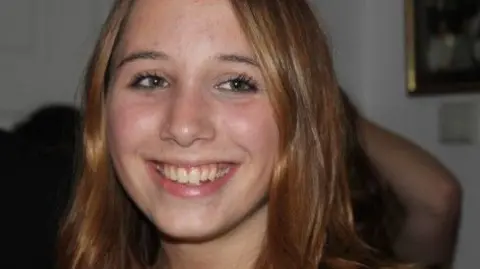Goodmayes: Ward risks remained after patient death, jury told

 Family handout
Family handoutA former health care assistant on a ward where a young woman took her own life using a bin bag has told a jury they continued to be used there after her death.
Alice Figueiredo was 22 when she died at Goodmayes Hospital in Redbridge, north-east London, in July 2015.
She had been detained on the unit since February of that year, in which time the court was told she had tried to harm herself 18 times with bin bags found on the ward.
The North East London NHS Trust (NELFT) is accused of corporate manslaughter. The ward manager on the unit, Benjamin Aninakwa is accused of gross negligence manslaughter. Both deny the charges against them.
This article contains material some may find distressing.
Violet Storey told the jury at the Old Bailey that she had worked at NELFT in various roles at different sites since 2002.
She started working on Hepworth Ward, an acute psychiatric unit at Goodmayes Hospital, when it opened in 2011 as a health care assistant. She retired in 2016.
She had got to know Ms Figueiredo well over several admissions to the hospital.
“We had a very good rapport. It was like having a daughter on the ward. If she needed anything she’d come to me,” she told the court.
But Ms Figueiredo struggled with suicidal thoughts and attempted to self-harm. She had a diagnosis of bipolar affective disorder, the court was told.
 Google
GoogleMrs Storey described a number of incidents where she stopped Ms Figueiredo from self-harming.
In one case, she reported how Ms Figueiredo had been hiding a bin bag under her pillow for two days.
Mrs Storey cried as she remembered what happened on the night Ms Figueiredo died.
When she had arrived at work, Ms Figueiredo had been in a “celebratory mood”, and “bounded over” to hug her.
Her observation levels had been lowered, which Mrs Storey said meant she was getting better, and was closer to being able to go home.
Later that night the health care assistant was twice called to other parts of the hospital to deal with emergencies.
‘Feared the worst’
When she was able to return to Hepworth ward she checked in on all the patients, including Ms Figueiredo.
She told the court she found Ms Figueiredo’s room empty. She searched the ward for her, eventually finding her slumped in a communal toilet.
She called for help, went to find some equipment, then attempted resuscitation. A doctor came, then paramedics arrived.
Ms Figueiredo was taken to hospital where she later died.
Mrs Storey said she was still on the ward when the call came in to tell them. She told her colleague she had feared the worst. “You don’t need to tell me,” she recalled saying.
Mrs Storey told the court that the toilet where Ms Figueiredo was found was generally open for patients to use and had a bin with a bin bag in it.
The court had previously heard that the toilet was kept locked, except when patients asked to use it.
She told the court that after Ms Figueiredo’s death she took some time off, but when she returned to the ward the bin bags were still being used in the communal toilet where Ms Figueiredo died.
The trial continues.
If you’ve been affected by the issues in this story, help and support is available via the BBC Action Line.




